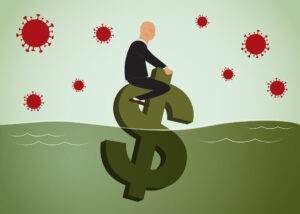(Photo by Al Drago/Getty Images)
Josh Blackman wants conservative justices to stop apologizing for “socially conservative rulings,” but what if, and hear me out, they stop making social/political rulings entirely and instead stick to just legal decisions?
Last Thursday, the Supreme Court decided Jones v. Mississippi. The question before the court in Jones was “[w]hether the Eighth Amendment requires the sentencing authority to make a finding that a juvenile is permanently incorrigible before imposing a sentence of life without parole.” If you are familiar with the court’s recent precedent in this area, you would be forgiven for having expected the Court to answer this question in the affirmative. After all, in 2005 the Court held that the Eighth Amendment forbid the imposition of the death penalty on juveniles. In 2010, the Court held that life without parole could not be imposed on juveniles for crimes other than homicide. More importantly, as it relates to the Jones case, in 2012 and 2016, the Court held that life without parole could not be imposed on juveniles except “for all but the rarest of juvenile offenders, those whose crimes reflect permanent incorrigibility.” Although there was clear precedent here, you see that was then, a mere five years ago, and this is a new Court with a new supermajority of social conservatives.
In Jones, a majority on the Court declared that neither the Eighth Amendment nor past cases require judges “to make a separate factual finding of permanent incorrigibility” when sentencing a juvenile offender to life without parole. Never mind that, as quoted above, this was exactly what prior case law required. The thing about having ideological domination is that you don’t have to care what was said before, and you don’t have to care about trivial little things like stare decisis. There is conservative policy to be made here people, and case law saying the opposite cannot get in the way!
The reaction to the Jones decision was for the most part unsurprising. In a piece in Slate, Mark Joseph Stern described it as “one of the most dishonest and cynical decisions in recent memory.” Stern’s description appears tough to argue with. In fact, I have not seen anyone even try. In his concurrence in Jones, Justice Clarence Thomas was perhaps less harsh in tone than Stern but ultimately reached a similar conclusion that the Court was overruling precedent while disingenuously claiming to follow it by employing what Thomas called a “strained reading.”
It seems easy to say that such dishonesty by our nation’s highest court should be objectionable to everyone. But not Josh Blackman, who among other things, is a regular (and often brilliant in my opinion) contributor to the Volokh Conspiracy at Reason. To Blackman, the objectionable part about the majority opinion in Jones was the conservative justices appeared to be *gasp* apologizing for making a socially conservative ruling. I’ll let Blackman explain:
The very last paragraph of Justice Kavanaugh’s majority opinion suggests that other branches of the Mississippi government should help the defendant, Brett Jones:
Finally, our holding today is far from the last word on whether Jones will receive relief from his sentence. Jones contends that he has maintained a good record in prison and that he is a different person now than he was when he killed his grandfather. He articulates several moral and policy arguments for why he should not be forced to spend the rest of his life in prison. Our decision allows Jones to present those arguments to the state officials authorized to act on them, such as the state legislature, state courts, or Governor. Those state avenues for sentencing relief remain open to Jones, and they will remain open to him for years to come.
Why? Why is this section necessary? The Supreme Court should focus on its own business, and let the other branches of state government do their jobs. Stay in your lane.
Of note, nowhere does Blackman raise an objection to the Court’s dishonesty in pretending to follow precedent when in actuality it is overturning prior case law. In fact, in another piece, Blackman stated he was “not interested in debating” whether the majority had correctly applied prior applicable case law. It is a tad ironic, to say the least, for a legal commentator to tell a court to “stay in your lane” for appearing to apologize to those impacted by a decision while at the same time refusing to discuss the legal question of whether the opinion misrepresents prior case law. But there is something more revealing about Blackman’s objection.
Describing a legal decision as a “socially conservative ruling” to me gives away the game being played by the Court. Specifically, that this “Court” is primarily politically driven. Where the law is regularly being supplanted in favor of the Justices’ preferred social policy desires. Of course, I know the Supreme Court has always done this to some extent, but this new “Court” is going off the rails.
To maintain legitimacy, any court needs to be upfront in what they are doing. I can’t believe I am saying this, but Justice Thomas is right. The only acceptable approach for the Supreme Court in Jones was “to be patently clear” that the majority disagreed with prior case law. Instead, the Court chose to lie even though the lie was plain to see for all. A possible reason why the conservative majority was perhaps nervous about taking an honest position in Jones is all the recent performative hand-wringing by conservative justices about how they strictly apply the law instead of just doing what they would like.
As long as the dishonesty results in socially conservative policy desires though, don’t expect Blackman to be raising any objection. Unless the justices start apologizing to those who are being negatively impacted of course, because that’s not their lane, you see.
 Tyler Broker’s work has been published in the Gonzaga Law Review, the Albany Law Review, and the University of Memphis Law Review. Feel free to email him or follow him on Twitter to discuss his column.
Tyler Broker’s work has been published in the Gonzaga Law Review, the Albany Law Review, and the University of Memphis Law Review. Feel free to email him or follow him on Twitter to discuss his column.



 Kathryn Rubino is a Senior Editor at Above the Law, and host of
Kathryn Rubino is a Senior Editor at Above the Law, and host of 











 Jordan Rothman is a partner of
Jordan Rothman is a partner of 




